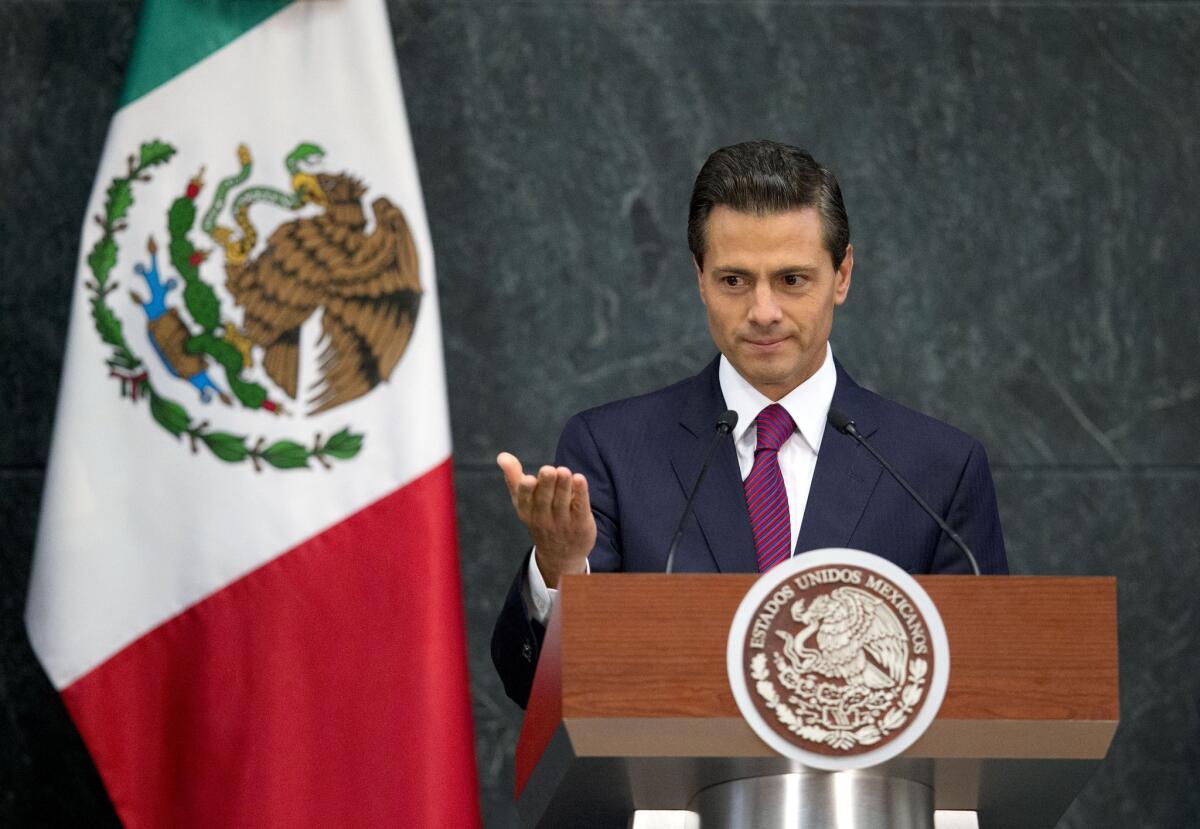Mexico’s Peña Nieto acknowledges ‘a difficult year’ and public anger

In this Aug. 27 photo, Mexico’s President Enrique Pena Nieto speaks during a news conference to announce Cabinet changes.
- Share via
Reporting from Mexico City — Mexico President Enrique Peña Nieto on Wednesday acknowledged that the nation has experienced a “difficult year” that has generated “anger” and damaged the public mood and trust.
The first half of his presidency has been characterized by a stagnant economy, corruption scandals and horrifying human rights abuses, as well as an agenda of constitutional reforms that have so far failed to deliver.
In his third state-of-the union address, Peña Nieto pledged to focus on strengthening Mexico’s rule of law and on reducing poverty and inequality during the three years remaining in his presidential term. He also said it was time for members of his administration to tighten their belts, promising austerity in public spending.
“Our country was deeply hurt by a series of cases and terrible events,” the president said in the opening minutes of his speech.
He made references to three of the most challenging events of the last 12 months: the abduction and presumed slayings of 43 college students in the southern state of Guerrero, the escape of Joaquin “El Chapo” Guzman from a high-security prison in July and the corruption allegations leveled at his wife and finance minister over conflict-of-interest property deals.
“All of those [incidents] have damaged the mood of Mexicans, and well as their confidence in government institutions,” he said.
Peña Nieto, whose popularity among Mexicans is at an all-time low, nevertheless insisted that his Institutional Revolutionary Party administration is fulfilling the promises it made when he became president at the end of 2012.
“We can say with pride that Mexico is moving forward,” he said, pointing to reforms in the telecommunications, education, fiscal and energy sectors as success stories.
Peña Nieto came to power on a wave of optimism for change, dubbed “Mexico’s Moment” at the time.
But economic growth has been poor and poverty has increased during his presidency. The first auction in July to sell the rights to drill for oil in Mexico — part of the energy reform aimed at opening Mexico’s energy resources to foreign investment — was a flop, in part because of the low global oil price and poor management of the auction by the country’s Finance Ministry, analysts say. Only two of the possible 14 blocks up for sale were sold off.
Miriam Grunstein, an energy expert with Rice University’s Mexico Center, said the government underestimated how long it would take for benefits to show.
“The political nature of the energy sector make it very difficult to make sound technical decisions. The demand to please is very powerful,” she said.
The low global oil price has also hit Mexico’s economy, which is reliant on oil exports. Economic growth has been sluggish at best during Peña Nieto’s time in power.
Based on the government’s performance so far, analysts had little optimism for economic improvement.
Economist Rogelio Ramirez said that the Mexican Moment is well and truly over.
“Economically there has been very little progress. Growth has been really poor, and there has barely been any increase in people’s income.”
Poverty and the gap between the rich and poor has increased since Peña Nieto took power, according to the National Council for Social Development Policy Evaluation. The number of people living in poverty rose from 45.5% to 46.2% from 2012 through 2014.
In his address, the president vowed not to increase taxes or introduce new ones.
“It falls to us, the government, to tighten our belts. We have to spend less, and spend more effectively.”
Alfonso Zarate, a political analyst, tied the lack of economic opportunities for Mexican young people to the reliance of a third of the population on the informal economy as well as the continued strength of organized crime. He says Mexico needs to see annual growth of at least 5% for things to really improve.
“The problem is very serious and frighteningly deep,” he said. “Millions and millions of Mexicans aren’t finding opportunities within the formal economy.”
Many of those turn to Mexico’s informal sector, or worse, to working for Mexico’s criminal gangs and drug trafficking organizations.
The financial and political influence of those groups can be felt acutely in states such as Guerrero, where the 43 students were abducted last year. A report this week from the Open Society Foundation said that justice in Guerrero is practically non-existent, with almost blanket impunity for gross human rights violations such as forced disappearances, homicide and torture.
Peña Nieto has maintained the campaign against drug trafficking and organized crime begun by his predecessor in 2006. Since then, more than 100,000 people have been killed or have disappeared.
Although advances have been made in reducing extortion and kidnapping, homicides in July went up by 17% from the same month last year, according to the latest government figures. Armed confrontations between criminal groups and the armed forces are common, and the army and police continue to be implicated in human rights violations such as extra-judicial killings, enforced disappearances and torture.
Javier Oliva Posada, a security specialist at Mexico’s National Autonomous University said, “They’re making the same mistakes as past presidents – they’re attacking the violence but not the causes.”
Bonello is a special correspondent. Cecilia Sanchez in Mexico City contributed to this report.
More to Read
Sign up for Essential California
The most important California stories and recommendations in your inbox every morning.
You may occasionally receive promotional content from the Los Angeles Times.












